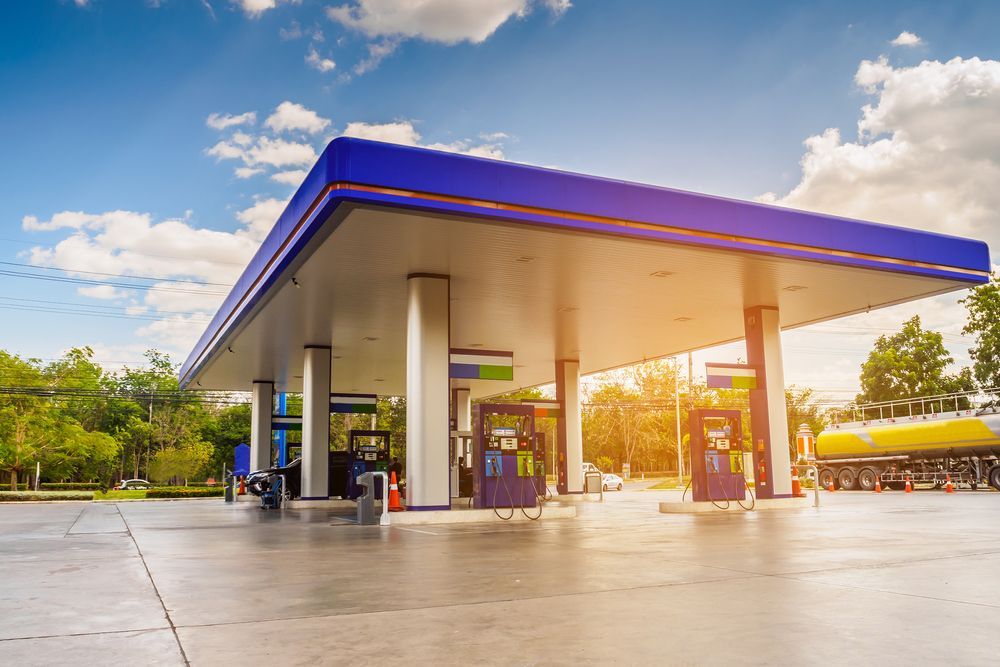Gas Station Insurance in California
Index
We Are a Trusted Insurance Agency for Gas Stations in California
Who Is California Gas Stations Insurance Meant for?
Why Do I Need Gas Stations Insurance in California?
Property Insurance for Gas Stations in California
Workers’ Compensation Insurance for Gas Stations in California
Business Interruption Insurance for Gas Stations in California
Product Liability Insurance for Gas Stations in California
Casualty Insurance for Gas Stations in California
Data Breach Insurance for Gas Stations in California
Business Owners Policy (Bop) for Gas Stations in California
Ways to Lower Your California Gas Stations’ Insurance Costs
Get The Best Rates on California Gas Stations’ Insurance
Contact Us
Phone
886-226-4436
Location
9340 Bolsa Ave, Westminster, CA 92683
Gas stations in California account for a significant portion of the fuel industry in the state. There are many risks that come with running a gas station, making it essential for owners to have adequate insurance coverage. Some of these risks include:
- Vandalism
- Theft
- Spoilage and contamination coverage for perishable stock
- Shoplifting
- Severe weather
- Property damage
- Bodily harm to customers on the property
- Fuel tank contamination
- Fraud
- Forgery
- Fires
- Employee, customer, or general public injury
- Crime and employee dishonesty
In California, gas station owners must carry several different types of insurance, such as property damage, liability, crime coverage, environmental clean-up, and workers’ compensation.
We Are a Trusted Insurance Agency for Gas Stations in California
The average cost of gas station insurance in California is between $750 and $1300 per year. The exact rate depends on various factors such as the location, size of the gas station, and number of employees.
At Western Insurance Marketing Corporation, we offer tailored insurance packages for gas stations in California. Our knowledgeable and experienced agents understand the unique needs of the industry and will work with you to ensure that your business is adequately protected.
We only partner with the best insurers in California and provide a comprehensive range of coverage options at competitive rates. Whether you need property damage or liability coverage, our team is here to help.
Protecting your gas station is essential for its success. Contact Western Insurance Marketing Corporation today to get started on an insurance package that meets all your needs!
Who Is California Gas Stations Insurance Meant for?
California is meant for anyone who owns or operates gas stations in the state. These include the following:
- Gas station owners
- Operators
- Employees
- Suppliers and contractors
If you are a gas station owner or operator, it is imperative that you have the right insurance coverage in place to protect your business.
Why Do I Need Gas Stations Insurance in California?
There are several key reasons why it is important to have gas station insurance in California:
- To protect your business from financial losses due to property damage, theft, liability claims, and other events.
- To provide coverage if you are sued for negligence or wrongful acts.
- To cover environmental clean-up costs in a fuel spill or contamination.
- To help cover workers’ compensation costs if an employee is injured on the job.
- To ensure that your customers and suppliers are protected from any potential liabilities related to using your services.
Having adequate gas station insurance in California can go a long way toward protecting your business and those who rely on you.
Property Insurance for Gas Stations in California
Property insurance is a type of coverage that protects businesses from the costs associated with property damage, theft, and other events that can occur on-site. It can also cover lost income due to business interruption due to a covered event such as a fire or flood. Property insurance for gas stations in California typically includes:
- Building Coverage – This covers damage to your building caused by fires, storms, vandalism, and other insured perils.
- Business Personal Property Coverage – This covers any equipment or inventory damaged or stolen on-site.
- Equipment Breakdown Coverage – This covers repairing or replacing any equipment that breaks down due to normal wear and tear or mechanical failure.
Workers’ Compensation Insurance for Gas Stations in California
Workers’ compensation insurance is required for any business with employees in California. It provides benefits to employees who are injured or become ill due to their job duties and protects employers from costly lawsuits. Gas station owners must have workers’ compensation coverage to protect their businesses and employees. The coverage typically includes:
- Medical expenses – This covers the cost of medical care for any workplace injuries sustained by an employee.
- Lost wages – This covers a portion of an employee’s lost wages while they cannot work due to a workplace injury or illness.
- Disability benefits – This covers the cost of disability payments if an employee cannot return to work after suffering an injury on-site.
- Death benefits – This covers the cost of funeral expenses and a portion of lost wages to the family of an employee who passes away due to a workplace injury.
Having adequate workers’ compensation insurance protects gas station owners from financial losses resulting from workplace injuries or illnesses while ensuring their employees receive necessary care and support during times of need.
Business Interruption Insurance for Gas Stations in California
Business interruption insurance is a type of policy that covers the financial losses associated with an unexpected disruption in business operations, such as a natural disaster or a power outage. These losses include lost revenue, relocation expenses, and other costs incurred due to the disruption.
Gas station owners can benefit greatly from having business interruption insurance because fuel delivery and sales are integral to their success. Without it, they may not be able to meet customer demand or pay their employees if there’s an unexpected disruption in service.
Business interruption insurance can help cover the cost of relocating operations while repairs are being made, so the gas station can get back up and running as quickly as possible. It also helps protect against any potential losses due to decreased demand or reduced supply.
Additionally, business interruption insurance can provide financial support in the event of a natural disaster or other major event that affects the company’s ability to operate.
Product Liability Insurance for Gas Stations in California
Product liability insurance is a type of policy that protects businesses from potential financial losses if their customers experience an injury or illness due to using their products. This type of insurance is especially important for gas station owners, who must provide customers with safe and reliable fuel.
If a customer experiences an adverse reaction to the fuel, they could file a lawsuit against the business, which could be financially devastating without proper coverage. Product liability insurance helps protect businesses from these types of losses by covering legal fees and any associated damages.
Casualty Insurance for Gas Stations in California
Gas stations hold petrol, which is highly flammable and can cause extensive damage if a fire breaks out. For that reason, gas station owners in California need to have casualty insurance to protect against any potential losses due to fires, explosions, or other disasters.
This type of policy helps cover the cost of repairing physical damage and replacement costs for lost inventory and equipment.
Data Breach Insurance for Gas Stations in California
With the advent of digital technologies, gas stations must also be prepared to protect their customers’ data in the event of a data breach. Data breach insurance helps protect businesses from financial losses incurred if customer information is compromised due to a cyber-attack or other security incident. This type of policy can help cover legal fees, credit monitoring services, and other associated costs.
Business Owners Policy (Bop) for Gas Stations in California
Business owners' policies (BOPs) are a type of insurance package specifically designed to meet the needs of small business owners. A BOP typically includes property, liability, and other coverages tailored to a specific industry.
For gas station owners in California, a BOP policy can help protect against losses related to fires, explosions, theft, customer injuries, and other perils. It can also contain certain cyber liability coverages, such as data breach insurance, to help protect against losses related to security incidents.
Ways to Lower Your California Gas Stations’ Insurance Costs
As a gas station owner in California, you can lower your insurance costs in several ways. They include:
- Analyze and adjust your coverage. Ensure you have the right amount of coverage for your business needs, but not too much that it unnecessarily increases costs.
- Bundle coverages. Bundling multiple coverages into a single policy can reduce premiums and simplify payments.
- Shop around for quotes. Don't just go with the first policy you find; compare prices with multiple insurers to get the best deal.
- Increase deductible amounts. Higher deductibles can reduce premiums. Just make sure you have enough cash on hand to cover any claims in case of an emergency.
- Take advantage of discounts. Many insurance companies offer discounts for safety measures like alarm systems and smoke/fire detectors or if you are a member of certain trade organizations.
- Consider captive insurance programs. Captive insurance programs are designed for businesses that traditionally have high risks; they involve pooling resources from multiple business owners and sharing the costs across all members.
- Invest in risk management and prevention measures. Implement policies and procedures to reduce workplace liabilities and minimize potential risks, such as employee training, fraud monitoring, and cybersecurity protocols.
- Install safety equipment. Installing fire suppression systems, emergency shut-off valves, or other safety measures can help reduce premiums.
- Implement loss control measures. Proactive management of losses through employee training and other methods can help reduce claims costs over time.
- Purchase additional coverages.
Look into specialized liability coverages such as product liability, cyber liability, and errors & omissions insurance to help protect your business from unforeseen risks.
Get The Best Rates on California Gas Stations’ Insurance
Western Insurance Marketing Corporation bridges the gap between insurers and California gas stations. Our experienced agents work with you to understand your unique risks and find the right coverage for your business at the most competitive rate.
We ensure our customers are adequately covered and have access to all available insurance options.
Contact us today to learn more about how we can help you get the best rates on California gas station insurance.
How much does it cost to run a gas station?
The cost to run a gas station varies significantly depending on factors such as location, size, business model, and fuel prices. However, here are some of the key costs associated with running a gas station:
- Real Estate and Rent: The cost of land or lease agreements is one of the biggest expenses. Rent prices can vary based on the location (urban areas tend to have higher rent costs than rural areas).
- Fuel Costs: Purchasing fuel wholesale and maintaining a profitable margin is a primary cost. Gas stations also need to deal with fluctuations in fuel prices and storage costs.
- Utilities: The cost of electricity, water, heating, and other utilities can add up, especially if the station offers services like a convenience store or car wash.
- Labor Costs: Salaries for employees, including managers, cashiers, and attendants, are significant. The number of employees depends on the size of the station and the services offered.
- Maintenance: Regular maintenance of fuel pumps, tanks, and other equipment is necessary for safe operation. This also includes cleaning and maintaining the property.
- Insurance: Gas stations require various types of insurance, such as liability insurance, property insurance, and workers' compensation, which can be costly due to the hazardous nature of fuel and the high risks involved.
- Licensing and Regulatory Costs: Gas stations must comply with local, state, and federal regulations, which can involve costs for permits, inspections, and compliance with environmental and safety standards.
- Miscellaneous Costs: Marketing, advertising, taxes, and other overhead costs contribute to the operational expenses.
What is the gas station rule?
The "Gas Station Rule" is a concept used in various disciplines like mathematics and problem-solving. In the context of Antarctica, it refers to the idea that there is no real infrastructure in many remote places, such as the South Pole, and thus it's essential to prepare adequately for self-sufficiency.
In simple terms, the Gas Station Rule suggests that you can only travel as far as the gas in your tank will allow, meaning you should never set out without enough resources (fuel, food, etc.) to get back to safety or the starting point. The idea highlights the importance of proper planning and preparedness, especially in extreme and isolated environments like Antarctica.
Can I Bundle Gas Station Insurance Policies?
Yes, bundling multiple insurance policies can be both convenient and cost-effective. Many insurers offer Business Owners' Policies (BOP) that combine general liability, property insurance, and business interruption coverage into a single package.
Do I Need Pollution Liability Insurance for My Gas Station?
Given the environmental risks associated with fuel storage and dispensing, pollution liability insurance is crucial for gas stations in California. It covers costs related to accidental spills, leaks, and the necessary cleanup efforts. In some areas, this coverage is legally required
Is Gas Station Insurance Mandatory in California?
Yes, certain types of insurance are mandatory for gas stations in California:
- Workers' Compensation Insurance: Required for all businesses with employees, covering medical expenses and lost wages for work-related injuries or illnesses.
- General Liability Insurance: While not legally mandated, it's highly recommended to protect against potential lawsuits from accidents or injuries occurring on your premises.
- Pollution Liability Insurance: In some cases, this is legally required due to the environmental risks associated with fuel handling and storage.










